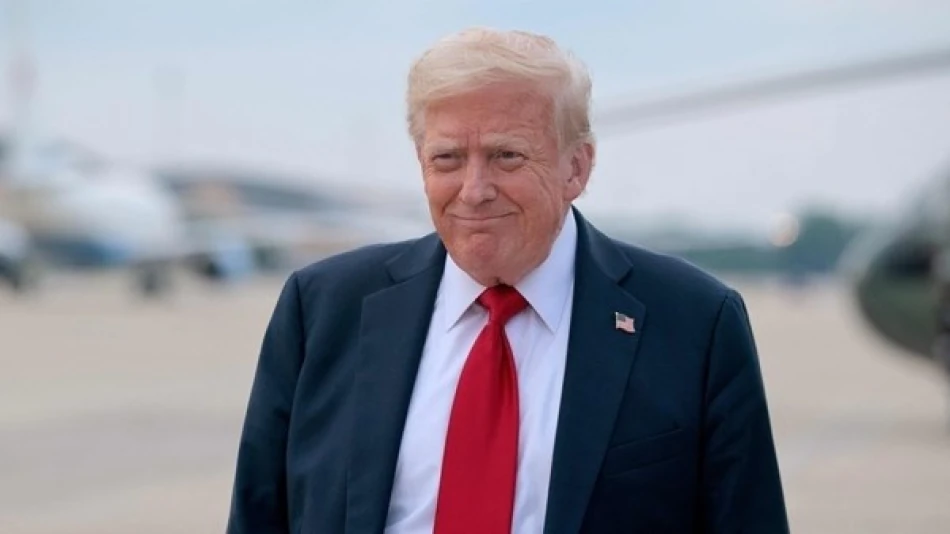
Trump Advocates for Unrestrained AI Development, Challenges Copyright Laws
Trump Declares War on AI Copyright Restrictions in Bold Move to Secure US Tech Dominance
President Donald Trump has thrown down the gauntlet in the global AI race, declaring that American artificial intelligence models should operate free from copyright constraints when training on publicly available content. Speaking at an AI summit Wednesday, Trump argued that requiring payment for every piece of training data would cripple US innovation while competitors like China's DeepSeek advance unconstrained by similar legal hurdles.
The Human Learning Analogy That Could Reshape AI Law
Trump's reasoning centers on a simple but potentially revolutionary comparison: "When a person reads a book or article, they get great information. That doesn't mean you violated copyright laws or should have to make deals with every content provider."
This analogy strikes at the heart of ongoing legal battles between AI companies and content creators. Major publishers, artists, and media organizations have filed numerous lawsuits against OpenAI, Microsoft, and other tech giants, claiming their models were illegally trained on copyrighted material without permission or compensation.
Executive Orders Signal Aggressive Pro-AI Stance
Beyond rhetoric, Trump backed his position with concrete policy moves, signing executive orders to accelerate data center licensing and promote US AI technology exports. "From this day forward, it will be US policy to do whatever it takes to lead the world in artificial intelligence," he declared.
These orders represent a sharp departure from the previous administration's more cautious approach to AI regulation, signaling that the US intends to prioritize competitive advantage over content creator protections.
Market Implications: A Windfall for Big Tech, Headwinds for Media
For investors, Trump's stance creates clear winners and losers. AI companies like OpenAI, Microsoft, and NVIDIA stand to benefit enormously if copyright restrictions are loosened or eliminated entirely. The cost savings from avoiding licensing deals with millions of content creators could run into billions of dollars annually.
Conversely, media companies and content creators who hoped to monetize their intellectual property through AI licensing agreements may find their bargaining power severely weakened. Publishers who invested heavily in building AI licensing frameworks could see those investments become worthless overnight.
The China Factor Drives Urgency
Trump's aggressive stance appears motivated by growing concern over Chinese AI capabilities, particularly after DeepSeek's recent breakthrough in developing competitive models at a fraction of typical costs. Unlike US companies, Chinese AI developers operate in an environment with fewer copyright constraints, potentially giving them a significant competitive advantage.
This dynamic mirrors earlier technology competitions where regulatory differences between nations created asymmetric advantages. The semiconductor industry faced similar challenges when different countries imposed varying export controls and research restrictions.
Legal and Ethical Battlegrounds Ahead
Trump's position sets up a potential collision course with ongoing copyright litigation and could force Congress to clarify fair use protections for AI training. The entertainment industry, journalism, and publishing sectors have invested heavily in legal challenges that could be undermined by executive policy changes.
However, the president's authority to influence copyright law remains limited without congressional action. Federal courts will likely continue adjudicating existing cases regardless of executive branch preferences, creating potential conflicts between judicial precedent and administrative policy.
Global Competitive Implications
If successful, Trump's approach could accelerate US AI development while potentially creating diplomatic tensions with allies who maintain stricter copyright protections. The European Union's more restrictive AI regulations already create compliance challenges for American companies, and this divergence could widen further.
The ultimate test will be whether loosened copyright restrictions actually translate into meaningful competitive advantages, or whether other factors like computing resources, talent acquisition, and algorithmic innovations prove more decisive in determining AI leadership.
Most Viewed News

 Layla Al Mansoori
Layla Al Mansoori






